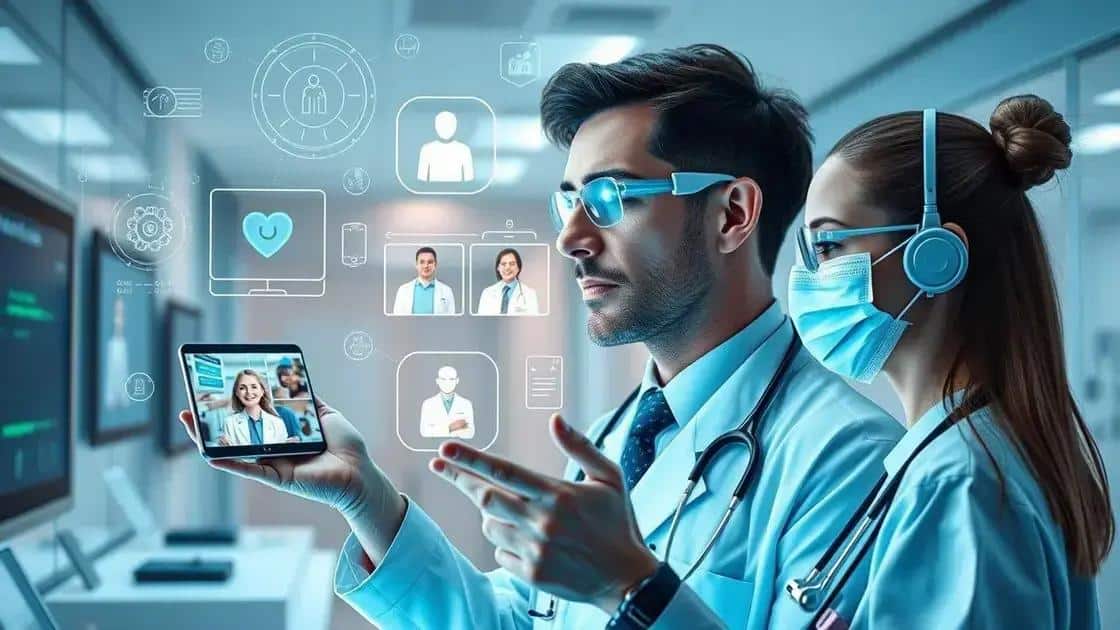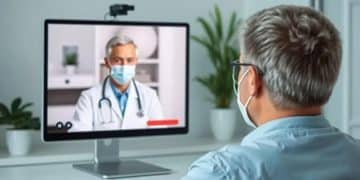Insights on health tech advancements in modern care

Health tech advancements, including telemedicine, wearable devices, and AI integration, are revolutionizing patient care by enhancing accessibility, personalizing treatment, and improving outcomes across the healthcare landscape.
Insights on health tech advancements are reshaping the way we think about patient care. Have you noticed how technology influences our health journeys? Join me as we explore the latest innovations that are making a difference.
Current trends in health technology
Current trends in health technology are rapidly evolving and changing the way we approach patient care. As we dive into this fascinating landscape, we can see new innovations that improve outcomes and enhance the overall experience. Let’s explore what these trends entail and their significant impact.
Telehealth and Virtual Care
One of the most noteworthy trends is the rise of telehealth. This has made healthcare more accessible to patients. By providing remote consultations, patients can receive care from the comfort of their homes.
- Convenience and accessibility for patients
- Reduced wait times for appointments
- Regular follow-ups through virtual check-ups
As telehealth grows, it is becoming an essential tool for managing chronic illnesses and routine care.
Artificial Intelligence in Healthcare
Artificial Intelligence (AI) is making waves in the health tech sector. AI tools can analyze vast amounts of data quickly and accurately. This leads to improved diagnosis and personalized treatment plans.
- Predictive analytics for better health outcomes
- Machine learning helping in early disease detection
- AI-driven virtual health assistants
These advancements not only save time but also enhance patient safety.
Another significant trend is the use of wearable technology. Devices like fitness trackers and smartwatches monitor vital signs and overall health. This empowers patients to take charge of their health and stay informed. As users track their data, they can notice patterns and make informed decisions.
Data Security in Health Tech
With the integration of technology, protecting patient data has never been more critical. The current focus on data security ensures patient information remains confidential and secure. This has led to new regulations and technologies aimed at preventing breaches and enhancing privacy.
These trends illustrate how health technology is evolving and improving patient care. As we embrace these advances, we can expect a healthier future for everyone.
Impact of telemedicine on patient care

The impact of telemedicine on patient care has been significant in recent years, especially as technology evolves. With telemedicine, patients can conveniently connect with healthcare providers from home. This shift is reshaping the healthcare landscape.
Accessibility for Patients
Telemedicine offers greater accessibility, making it easier for individuals to seek medical advice. Many patients, especially those in rural areas, may find it challenging to visit a doctor. With virtual visits, they can receive timely care without traveling long distances.
- Reduced barriers to accessing care
- Better management of chronic conditions
- Easier follow-up appointments
This increased access can lead to better health outcomes, as patients are more likely to seek help when needed.
Cost-Effectiveness
Another crucial aspect is the cost-effectiveness of telemedicine. Virtual consultations often reduce overhead for healthcare facilities and lower costs for patients.
- Lower transportation costs
- Fewer missed work days for appointments
- Less time spent in waiting rooms
As a result, patients can receive quality care while saving money and time.
Moreover, telemedicine encourages better adherence to treatment plans. Patients can easily check in with their doctors, ask questions about medication, and discuss any concerns. This ongoing support is vital for managing health effectively.
Challenges to Overcome
Despite its benefits, telemedicine faces challenges. Not all patients may be comfortable using technology, and some may lack access to proper devices. Healthcare providers must ensure that they provide support to help patients navigate these digital tools.
Moreover, reimbursement policies for telemedicine services can be complex, and regulations may vary by region. As the healthcare landscape continues to change, addressing these challenges will be key to maximizing the benefits of telemedicine.
Wearable devices and health monitoring
Wearable devices have transformed the world of health monitoring. These gadgets help individuals track their health metrics conveniently and accurately. Whether it’s a smartwatch or a fitness tracker, they provide valuable insights into our daily routines.
Types of Wearable Devices
Many types of wearables are available, catering to various health and fitness needs. From heart rate monitors to sleep trackers, these devices help users stay informed about their health status.
- Smartwatches that monitor heart rate and activity levels
- Fitness bands that track steps and calories burned
- Advanced health monitors that measure oxygen levels and ECG
These tools empower users to take control of their health by providing real-time data.
Benefits of Health Monitoring
The benefits of utilizing wearable devices for health monitoring are immense. They can encourage a more active lifestyle and help identify potential health issues early.
- Promotes regular physical activity through reminders and goals
- Informs users about sleep patterns and quality
- Enables better management of chronic conditions like diabetes
By tracking health metrics, users can make informed decisions and stay motivated to improve their well-being.
Additionally, integrating wearable devices with health apps enhances the overall user experience. These apps allow for comprehensive analysis and long-term tracking of health trends. Users can set personal goals, receive feedback, and share data with healthcare providers.
Challenges and Considerations
While wearables offer many advantages, there are challenges to consider. Not all users may fully understand how to use these devices effectively. Furthermore, privacy and data security are significant concerns; users must ensure that their personal health data is protected.
Despite these challenges, the potential of wearable technology to enhance health monitoring is undeniable. As these devices become more advanced, they will play a crucial role in our health and wellness journeys.
Future predictions for health tech innovations

The future predictions for health tech innovations promise exciting advancements that could reshape the healthcare landscape. As we look ahead, it’s clear that technology will play a crucial role in how we manage our health.
Increased Integration of AI
One major prediction includes the increased integration of artificial intelligence (AI) in healthcare systems. AI has the potential to enhance diagnostics, personalize treatment plans, and analyze vast amounts of data quickly.
- Improved predictive analytics for early detection
- Enhanced patient monitoring through smart algorithms
- Automation of routine tasks for healthcare professionals
With AI, healthcare can become more efficient and tailored to individual needs.
Expansion of Telehealth Services
Another significant trend is the expansion of telehealth services. As technology becomes more accessible, we can expect telehealth to reach more patients globally. Virtual visits will likely become the norm for various medical consultations.
- Increased access to specialists for remote patients
- Real-time health support and follow-ups from home
- Cost savings for both patients and healthcare providers
This will not only enhance convenience but also improve overall health outcomes.
Moreover, wearable devices will continue to evolve. Consumers can expect more advanced models that track a wider range of health metrics. This will empower individuals to monitor their wellness actively and share this data with healthcare teams.
Blockchain Technology in Health Records
Additionally, the use of blockchain technology is a promising innovation. It can ensure the security and authenticity of health records while allowing for secure sharing between providers. This could lead to seamless and efficient healthcare management.
As healthcare continues to evolve, embracing these innovations will be key to enhancing patient care. By leveraging technology, we can look forward to a future where healthcare is more accessible, personalized, and efficient.
The innovations in health technology are paving the way for a brighter future in healthcare. As we embrace telemedicine, wearable devices, and advancements in artificial intelligence, we are witnessing a transformation in how we approach health and wellness. These trends not only improve access to care but also enhance patient experience and outcomes. By staying informed and adapting to these changes, everyone can benefit from a healthcare system that is more personalized, efficient, and accessible to all.
FAQ – Frequently Asked Questions about Health Tech Innovations
What is telemedicine?
Telemedicine allows patients to consult healthcare providers remotely using video calls, making healthcare accessible from home.
How do wearable devices enhance health monitoring?
Wearable devices track health metrics like heart rate and activity levels, empowering users to manage their health proactively.
What role does artificial intelligence play in healthcare?
AI enhances diagnostics, personalizes treatment plans, and analyzes patient data to improve overall care efficiency.
How can I ensure the security of my health data?
It’s important to use secure platforms and be aware of privacy regulations to protect your personal health information.





